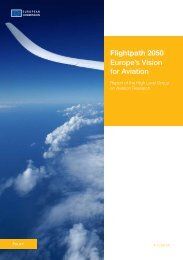Create
Final Report - Acare
Final Report - Acare
- No tags were found...
Create successful ePaper yourself
Turn your PDF publications into a flip-book with our unique Google optimized e-Paper software.
6000<br />
5000<br />
Unique visitors<br />
Number visits<br />
4000<br />
3000<br />
2000<br />
1000<br />
0<br />
01 02 03 04 05 06 07 08 09 10 11 12 01 02 03 04 05 06 07 08<br />
Figure.5. Innopedia website visits from 01/2009 to 08/2010<br />
34<br />
of interest to the visitor from the point of<br />
information gathering while there seems to be<br />
insufficient incentive for a visitor to bring an<br />
idea to the site.<br />
There may be several explanations for this:<br />
1. It is too difficult for a visitor<br />
to become a member.<br />
Based on reactions from and problems<br />
experienced by new members, the<br />
membership application to Innopedia is easy<br />
as compared to other application systems.<br />
2. A visitor has no ideas to bring<br />
to Innopedia.<br />
Wikipedia does not contain an extensive<br />
amount of information on aeronautics,<br />
while its content strongly depends on the<br />
knowledge and willingness of individuals<br />
to upload existing knowledge. The crowd<br />
using Wikipedia is vast while the group<br />
of actual contributors is just a fraction of<br />
this. However, this fraction (few percent) is,<br />
worldwide, large enough to give Wikipedia<br />
its content. The law of economies of scale<br />
applies here.<br />
The aeronautics community is a relatively<br />
small group. Hence, when only a small<br />
fraction of this group contributes to<br />
Innopedia this will be a relatively small<br />
number of people. The number of people<br />
with new ideas will be even less. The law<br />
of economies of scale may not apply to the<br />
aeronautics sector.<br />
3. A visitor does not want to bring<br />
his idea to Innopedia.<br />
This may be a serious issue as any good<br />
idea can be easily lost to somebody else for<br />
exploitation. Innopedia within the CREATE<br />
project has no system for protecting any<br />
IPR. It may be argued that new ideas<br />
(with a very low TRL level) may not yet<br />
incorporate any intellectual property.<br />
However, an idea holder may believe<br />
that his idea has a certain value. He may<br />
change his mind if/when he is rewarded for<br />
bringing his idea to Innopedia.<br />
4. It takes too much effort to put an idea on<br />
Innopedia.<br />
It obviously takes some effort to put an<br />
idea on Innopedia. Whether the effort is<br />
too big depends on the individual and his<br />
motivation. Several users have indicated<br />
that the site is not difficult from a user's<br />
point of view. Experience shows that when<br />
an idea has been described in e.g. Word<br />
that it is very easy to upload it to Innopedia.<br />
5. Innovative ideas are difficult to generate.<br />
Innovative ideas either already exist or pop<br />
up rather arbitrarily when discussing or<br />
thinking over a subject with others.<br />
6.4.4. Lessons learned<br />
The test of Innopedia demonstrated that<br />
establishing a wiki that is used by a significant<br />
population is much more difficult than merely<br />
setting up the site. The publicity needed<br />
among the target audience is critically<br />
important to the success of the venture.



